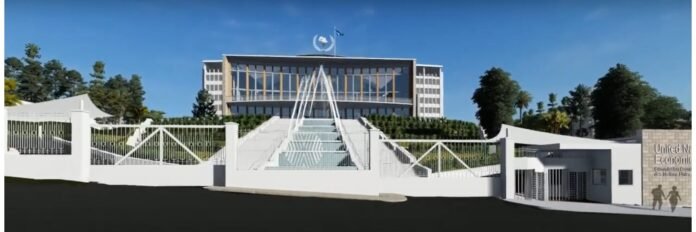Significance of Africa Hall’s Renovation
The renovation of Africa Hall serves as a significant milestone, embodying the themes of African unity and progress. Historically, Africa Hall stands as a venerable symbol of hope and aspiration for the African people. It has long been a venue for gatherings that foster dialogue among languages, cultures, and traditions—elements that unite the diverse nations of the continent. Originally built in the 1960s, the hall has hosted countless events, reflecting the spirit of collaboration and solidarity among African nations.
During the inauguration ceremony, representatives from the Group of 77 and China, along with members of the African Group, shared poignant remarks emphasizing the hall’s pivotal role in showcasing Africa’s rich heritage and culture. Their expressions highlighted not only the architectural revival of the space but also its deeper significance as a platform for advocating African voices on the global stage. They reiterated that Africa Hall is not merely a structure but a repository of collective memories and aspirations, illustrating the continent’s journey towards sustainable development.
The Ethiopian government’s contributions were integral to this renovation, signifying a committed investment in the future of African infrastructure and cultural heritage. By prioritizing the revitalization of this landmark, Ethiopia demonstrates its dedication to fostering a greater sense of identity and pride among African nations. This project reflects a broader vision; it is expected to enhance diplomatic relations, nurture cultural expressions, and serve as a catalyst for sustainable initiatives across Africa.
Ultimately, the renovation of Africa Hall symbolizes a renewed commitment to Africa’s future, fostering a spirit of collaboration and understanding among its countries. It provides a crucial foundation for future endeavors, making it a beacon for ongoing progress in unity and prosperity.
ECLAC North Building: Striving for Net-Zero Emissions
The renovation of the ECLAC North Building in Santiago, Chile, represents a significant move towards establishing a net-zero emissions standard within the United Nations infrastructure. By aiming for net-zero energy status, this project is poised to become a benchmark for sustainable construction practices not only in Chile but across the globe. The renovation underscores a commitment to environmental responsibility, reflecting the growing recognition of the importance of sustainability in all facets of development.
As the renovation progresses, various representatives have highlighted the multifaceted benefits of adopting sustainable building practices. The focus on energy efficiency is paramount; new technologies and design strategies are being integrated to minimize energy consumption and utilize renewable resources. These enhancements are expected to yield substantial operational cost reductions over time, allowing resources to be redirected to other priority initiatives. Furthermore, the implementation of green building technologies improves indoor air quality and overall working conditions, contributing positively to the health and productivity of ECLAC staff.
In addition to the environmental and financial advantages, the project signifies a broader cultural shift within the organization toward valuing sustainability. The commitment to becoming a model for environmental stewardship aligns with global efforts to combat climate change, reinforcing ECLAC’s role as a key player in promoting sustainable development. The support provided by the Chilean government throughout this renovation has been instrumental in advancing these initiatives. Their collaboration demonstrates a shared vision for a sustainable future and highlights the significance of local partnerships in achieving ambitious environmental goals.
Ultimately, the ECLAC North Building’s renovation is more than just a structural enhancement; it is an emblematic step towards fostering environmental responsibility and promoting best practices in sustainable construction within the United Nations and beyond.
Commitment to Quality and Transparency in Construction
The commitment to high standards in the renovation of Africa Hall and the ECLAC North Building reflects a broader dedication to quality and transparency in construction projects overseen by the United Nations. Reports from various UN representatives underline the significance of maintaining stringent quality controls, ensuring that all aspects of the renovation adhere to established benchmarks. The Secretary-General’s reports have consistently highlighted the critical role of project governance in achieving these objectives. Comprehensive oversight mechanisms have been put in place to monitor construction activities, ensuring they align with international best practices.
Financial accountability remains a cornerstone of the renovation initiatives. The UN’s approach emphasizes a transparent financial management system that enables stakeholders to track expenditures and assess whether projects remain within their allocated budgets. Ensuring adherence to budgets not only fosters trust among donors and member states but also serves as an assurance that resources are employed judiciously. The importance of timely execution is underscored as delays can lead to increased costs and a subsequent erosion of public confidence in large-scale projects.
To further reinforce this commitment, the reports detail the implementation of rigorous performance assessments at various stages of the construction process. These assessments evaluate the effectiveness of work carried out and ensure that any arising issues are addressed promptly. Such a proactive approach is essential in achieving the desired outcomes for these prestigious projects. Ultimately, the focus on quality, transparency, and governance not only enhances the credibility of the renovation efforts but also ensures that the outcomes serve the anticipated benefits for the communities and stakeholders involved.
Future Prospects and Completion Timelines
The anticipated completion of the Africa Hall renovation and the ECLAC North Building project marks a significant milestone in the United Nations’ commitment to upgrading its facilities to meet modern standards. Initial timelines have been set, with the Africa Hall expected to host its inaugural event in the first quarter of 2025. This will not only signify the end of a comprehensive renovation but also represent a renewed commitment to preserving the historical significance and cultural relevance of the Hall. The enhancements are designed to create a conducive environment for discussions and collaborations among member states, thereby strengthening diplomatic ties and enhancing operational efficiencies.
Simultaneously, the ECLAC North Building project is projected to culminate in late 2025. This timeline reflects a deliberate focus on construction and design processes that prioritize sustainability and energy efficiency. The shift towards a net-zero emissions standard signifies an innovative approach to environmental responsibility within UN operations and projects. As such, the completion of this facility is poised to position the ECLAC office as a leader in sustainable practices, setting a precedent for future projects under the UN.
Both projects not only aim at providing modernized work environments but also embody the UN’s commitment to fostering collaborative frameworks among member states. The implications of these renovations extend beyond state-of-the-art infrastructure; they reaffirm the UN’s dedication to creating environments that support sustainable development goals and enhance the operational framework necessary for addressing global challenges. As these facilities come to fruition, they are expected to facilitate more dynamic engagements and promote innovative solutions essential in today’s complex international landscape.


